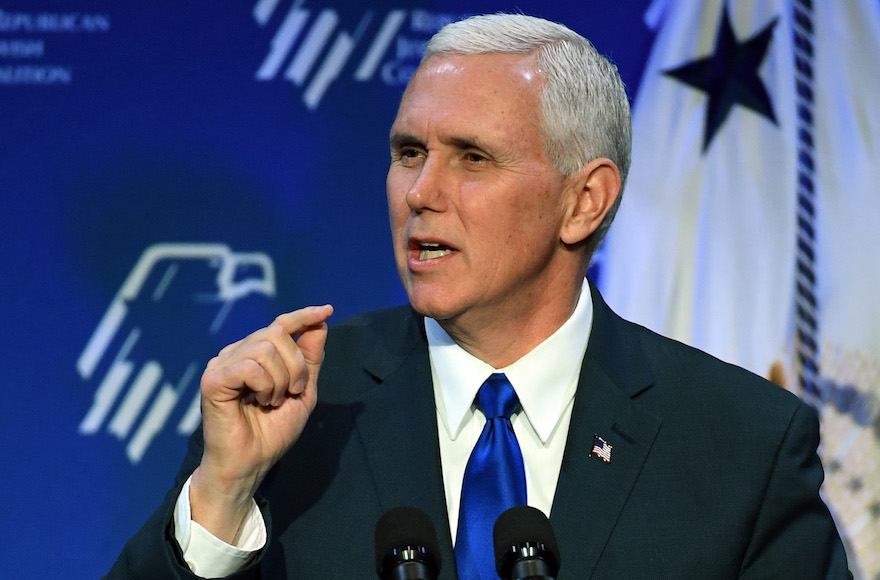Pence to visit Western Wall after pro-Israel speech


US Vice President Mike Pence will visit Jerusalem’s Western Wall on Tuesday while Palestinians plan a general strike and protests after denouncing his fervently pro-Israel speech the previous day as “messianic”.
The devout Christian’s speech to the Israeli parliament on Monday laden with biblical references was praised by Israelis as perhaps the best they could ever hope for from a US administration, but Palestinians saw it as confirming some of their worst fears.
Pence proudly reaffirmed US President Donald Trump’s December 6 declaration of Jerusalem as Israel’s capital and pledged to move the embassy to the disputed city by the end of 2019.
The vice president said “the friendship between our peoples has never been deeper. And I am here to convey a simple message from the heart of the American people: America stands with Israel.”
Pence, whose trip is being boycotted by the Palestinians, will on Tuesday visit one of the holiest sites in Judaism, the Western Wall.
The site lies in Israeli-annexed east Jerusalem, the sector the Palestinians want as capital of their future state, and many Israelis are likely to interpret it as Pence further backing their claim over the entire city.
In doing so, Pence will follow in the footsteps of Trump, who became the first sitting US president to visit the Western Wall in May last year.
Pence will also tour Jerusalem’s Yad Vashem Holocaust memorial.
He met Israeli President Reuven Rivlin on Tuesday morning, saying the White House believes the Jerusalem declaration “will set the table for the opportunity to move forward in meaningful negotiations to achieve a lasting peace and end the decades-long conflict.”
Rivlin responded by saying “inshallah” — or God willing in Arabic — after earlier calling Pence a “mensch”, the Yiddish word frequently used by Jews to describe an honourable person.
– ‘Gift to extremists’ –
The Palestinians face a dilemma in how to deal with what they see as a blatantly biased US administration as they seek to salvage hope of a two-state solution.
A top Palestinian official called Pence’s parliament speech “messianic” and a “gift to extremists,” and reiterated their view that the Trump White House is incapable of being an even-handed mediator in peace talks.
Pence has issued no criticism of Israel’s half-century occupation of the West Bank during his visit.
Around a dozen Arab Israeli lawmakers were expelled from the chamber as Pence began his speech after they shouted in protest.
On Tuesday, a general strike was being observed in the Palestinian territories, but there were expressions of resignation among some.
“It’s useless, the strike. Nothing will happen,” Adel Humran, a Palestinian against the strike, said in Ramallah.
“Only the shops will be closed. The people won’t benefit from it at all.”
The strike did not appear to be observed in east Jerusalem.
The Palestinian leadership has sought to look elsewhere for backing, and president Mahmud Abbas met European Union foreign ministers in Brussels on Monday.
The 82-year-old urged them to recognise a Palestinian state, but such a move was not forthcoming from the bloc as a whole.
Abbas said he was committed to negotiations, but he has sought an internationally led process.
Israeli Prime Minister Benjamin Netanyahu, bolstered by the unstinting support of the Trump adminstration, says there is no substitute for US leadership.
He has warmly welcomed Pence, calling him a “dear friend” and lauding Trump’s Jerusalem declaration.
– Deadly unrest –
The US move to recognise Jerusalem as Israel’s capital broke with decades of international consensus that the city’s status should be settled as part of a two-state peace deal between Israel and the Palestinians.
Unrest since the announcement has left 18 Palestinians dead, most of them killed in clashes with Israeli forces. One Israeli has been killed in that time.
Israel claims all of Jerusalem as its capital, while the Palestinians see the eastern sector as the capital of their future state.
Israelis and Palestinians alike interpreted Trump’s move as Washington taking Israel’s side in the conflict — a view reinforced by the White House’s recent decision to withhold financing for the UN agency for Palestinian refugees.
In Jerusalem, Pence reiterated Trump’s position that the United States will support a two-state solution to the Israeli-Palestinian conflict “if both sides agree.”
Pence’s visit, initially scheduled for December before being postponed, is the final leg of a trip that has included talks in Egypt and Jordan as well as a stop at a US military base near the Syrian border.
Arab outrage over Trump’s Jerusalem decision had prompted the cancellation of several planned meetings ahead of Pence’s tour.
